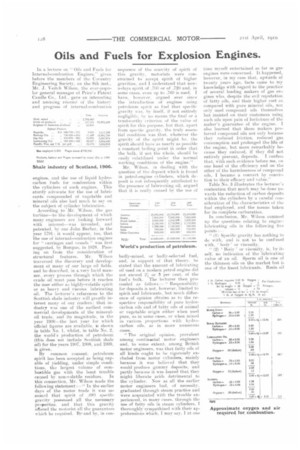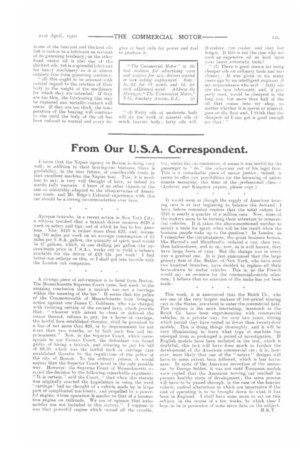Oils and Fuels for Explosion Engines.
Page 4

Page 5

If you've noticed an error in this article please click here to report it so we can fix it.
In a lecture on " Oils and Fuels for Internal-combustion Engines," given before the members of the Coventry Engineering Society, on the 8th inst., Mr. J. Veitch Wilson, the ever-popular general manager of Price's Patent Candle Co., Ltd., gave an intemsting and amusing resume of the history and progress of internal-combustion engines, and the use of liquid hydrocarbon fuels for combustion within the cylinders of such engines. This sturdy advocate for the Hfie of lubricants compounded of vegetable and mineral oils also had much to say on the subject of cylinder lubrication.
According to Mr. Wilsun, the gas turbine-to the development of which many engineers are looking forward with interest-was invented, and patented. by one John Barber, in the year 1791: it would appear. too, that the use of internal-combustion engine.s for " carriages and vessels " was first suggested. by Bompas, in 1828. Passing on from the consideration of structural features, Mr. Wilson traversed the discovery and development of many of our large nil fields. and he described, in a very lucid manner, every process through which the crude oil must pass before it reaches the user either as highly-volatile spirit or as heavy and viscous lubricating oil. The lecturer's refarences to the. Scottish shale industry will greatly interest many of our readers; that industry was one of the earliest commercial developments of the mineraloil trade, and its magnitude, in the year 1906-the last year for which official figures are available, is, shown in table No. 1, whilst, in table No. 2, the world's production of petroleum (this does not include Scottish shale oil) for the years 1907, 1908, and 1909, is given.
By cemmon consent, petroleum spirit has been accepted as being capable of yielding, under simple conditions. the largest volume of combustible gas with the least trouble caused by non-volatile residues. In this connection, Mr. Wilson made the following statement :-" In the earlier days of the motor trade it was assumed that spirit of 1380 specific gravity possessed all the necessary properties. and that this gravity offered the motoristall the guarantees which he required. Thsand by, in con sequence of the scarcity of spirit of this gravity, motorists were constrained to accept spirit of higher gravities, and I understand that nowii-days spirit of .700 or of .720 and, in some cases, even up to .760 is used. have, however, argued ever since the introduction of engines ilsing petroleum spirit as fuel that specific gravity was, by itself, if not entirely negligible. lu no means the final or a trustworthy criterion of the. value of spirit for this purpose, but. that, apart from specilic gravity, the truly essential condition was that, whatever the gravity of the spirit might be. the spirit should have as nearly as possible a constant boiling point in order that the bulk, if not the whole, should be easily volatilized under the normal working conditions of the engine."
Mr. Wilson. in dealing with the question of the deposit which is found in petrol-engine cylinders, which deposit is not infrequently attributed to the presence of lubricating oil, argued that it is really caused by the use of
badly-mixed, or badly-selected fuel, and, in support of that theory, he stated that the amount of lubricating oil used on a modern petrol engine did not exceed 2, or 3 per cent. of the fuel's bulk. The lecturer then proceeded as follows:" Responsibility for deposits is not, however, limited to spirit and lubricants, but much difference of opinion obtains as to the respective responsibility of pure hydrocarbon oils and of fatty oils of animal or vegetable origin either when used pure, as in 'some cases, or when mixed in various proportions with hydrocarbon oils, as in more numerous cases.
" The original opinion, prevalent among continental motor engineers and, to sonic extent. among British motor engineers, was that fatty oils of all kinds ought to be rigorously excluded from motor cylinders, mainly because it was believed that they would produce gummy deposits, and partly because it was feared that they might liberate acids detrimental to the cylinder. Now as all the earlier motor engineers had, of necessity. graduated through steam practice and were acquainted with the trouble experienced, in ninny cases, through the use of fatty oils in steam cylinders, I thoroughly sympathized with their apprehensions which, I may say. I at one
time myself entertained so far as gas engines were concerned. It. happened, however, in my case that, upwards of twenty years ago, facts came to my knowledge with regard to the practice of several leading makers of gas en, Ones who, despite the evil re-putation_ of fatty ,oils, and their higher cost as compared with pure mineral oils, not only used compound oils themselves but insisted on their customers using such oils upon pain of forfeiture of the maker's guarantee of the engine. also learned that these makers pre-. ferred compound oils not, only because they reduced friction, reduced gas consumption and prolonged the life of the engine, but more remarkably bes cause they reduced, if they did not entirely prevent, deposits. I confess that, with such evidence before me, on one hand of the efficiency and on the other of the harmlessness of compound oils. I became a convert by conviction to their efficacy and value."
Table No. 3 illustrates the lecturer's contention that much may be done towards the reduction of carbon deposits within the cylinders by a careful consideration of the characteristics of the fuel employed, and the means taken for its complete carburation.
In conclusion, Mr. Wilson summed up the questions relating to enginelubricating oils in the following five points: " (1) Specific gravity has nothing to do with, and is not to be confused with. body ' or viseosity.
" (2) 1 Body ' or viscosity, is, by itself. no indication of the lubricating value of an oil. Sperm oil is one of the thinnest oils on the market hut is one of the finest lubricants. Resin oil Is one of the heaviest and thickest oils but is useless as a lubricant on account of its gumming tendency; on the other hand castor oil is also one of the thickest oils, yet is a splendid lubricant for hen ;y machinery as it is almost entirely free from gumming tendeney, " (3) Oils ought to be selected with careful regard to the relation of their body to trio weight of the machinery for which they are intended. If they are too thin, the lubricating film may be ruptured and metallic contact will ensue. If they are too thick, the temperature of the bearing will continuo to rise until the body of the oil has been reduced to normal and every de
gree of heat calls for power and fuel to produce it.
"(4) Fatty oils of moderate body will do the work of mineral oils of much heavier body ; fatty oils will. therefore. run cooler, and they lest longer. If this is not the case wily use such an expensive oil as lard upon your Ii lest automatic tools?
" (5) There is good reason for using eheaper oils on ordinary tools and machinery. It was given to me many years ago by an intelligent engineer of my acquaintance who said -s fatty oils ere the best lubricants, and, if properly used, would he cheapest in the long run, but more than half of the oil that comes into my shop, no matter whether it is sperm or mineral. goes on the door and, T think that the cheapest oil I can get is good enough fur that.' "




















